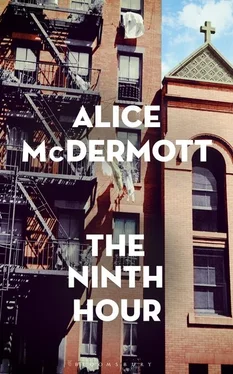MRS. TIERNEY SAID, “Good for you,” when Sally told her the next morning, through her bedroom door, that she was sleeping in. “Sure the Sisters can get along fine without you. Get your rest.”
Liz Tierney was happy to think that the girl was growing somewhat weary of all her good works: all the holiness and the loneliness and the sacrifice.
Mrs. Tierney understood only that Sally, having had a false start on her vocation, was once again spending her mornings following the nuns. Getting her courage up to try again. The estrangement between her and her mother, Liz Tierney believed, was another matter altogether.
On the following morning, when Sally announced at breakfast that she would not be helping the nuns at all anymore, Mrs. Tierney smiled. She told her own daughters, who were sitting right there with the girl at the kitchen table, that it was now their duty to make sure Sally had “a little fun at last.” She said, sympathetic and forgiving, “It’s an awful lot they ask of you, the Sisters. It’s a difficult life.” She said, “God’s not going to hold it against you if you’re something less than a blessed saint. Aren’t we all human? Aren’t we all doing the best we can?”
Elizabeth Tierney was full of admiration for the Sisters, who moved through the streets of the city in their black and white, doing good where it was needed, imposing good where they found it lacking.
She never failed to greet them as they passed—“Good morning, Sisters,” “How are you, Sister?”—or to put a penny or two in their baskets whenever she saw them begging. And although she sympathized with Annie’s disdain for the society ladies who raised money for the nuns, still Mrs. Tierney went to the bazaars and the card parties at the various convents and spent her husband’s money lavishly on aprons and raffle tickets and crocheted blankets, for the sake of the Sisters.
The nuns did more good in the world than any lazy parish priest, she liked to say, especially in arguments with her husband, especially after he learned that she had squandered the week’s household funds on euchre and bridge at some convent, or had given what he called “more than their fair share” to some plucky little Sister bound for pagan lands.
The priests were pampered momma’s boys compared to these holy women, Liz Tierney would argue. “Princes of the Church, my eye,” she would say—if only to get his goat—“Spoiled children they are. It’s the nuns who keep things running.”
Liz Tierney loved the nuns—adored them, she said—but she also harbored in her heart the belief that any woman who chose to spend a celibate life toiling for strangers was, by necessity, “a little peculiar.”
Mrs. Tierney was a devout Catholic, but the kind of Catholic, she knew, who preferred the noise and humidity of the street after mass to the cool dampness of the sacristy, preferred conversation to prayer, sunlight to flickering shadow.
She was a Catholic woman who was more moved by the miraculous blood that colored the cheeks of her six children as they fidgeted in the pew than she was by any injunction from the pulpit regarding the watery stuff that flowed from His pierced side for the salvation of all men.
Liz Tierney had nothing against the salvation of all men. She was as grateful for the fact of heaven as she was sure of her path toward it. She counted the Blessed Mother as first among her confidantes. She loved the order and the certainty the Church gave her life, arranging the seasons for her, the weeks and the days, guiding her philosophies and her sorrows. She loved the hymns. She loved the prayers. She loved the way the Church—the priests and the Brothers and the nuns, as well as the handy threat of eternal damnation—ordered her disorderly children.
But holiness bored her.
She liked chaos, busyness, bustling. She liked a household strewn with clothes and dust and magazines and books, jump ropes, baseball bats, milk bottles. She liked the sight and the smell of overflowing ashtrays, of a man who’s had a few drinks, of tabletops crowded with cloudy glasses. She loved falling into an unmade bed at the end of the long day, falling in beside her snoring husband—with maybe a child or two snagged in the covers—and never reaching, because sleep overtook her, the part of the Hail Mary that said: Now and at the hour of our death.
It was at the end of everything the Church had to say, in her opinion: Death was. And while she understood the need and logic of this, she had never found the subject of much interest.
Quoting her, our father sometimes said, “Isn’t it funny how we all die at the same time? Always at the end of our lives. Why worry?”
Liz Tierney preferred the bright distractions of living. She liked a good fight. She liked a long talk with plenty of gossip in it. She liked her husband when his passions were at high tide, and her children when they were rocking the boat: running, or laughing, full of outrage, full of schemes. She liked the sound of many voices in her house—liked it better still when they rose in a chorus of song. She liked stories of sin far better than tales of virtue. She liked the salty taste of contradiction on her tongue. She hated idleness. And long silences. She hated to see anyone doing anything alone.
When Sister Lucy appeared at her door for the second time in nearly twenty years, Sally all bedraggled beside her, not gone to the convent after all, Mrs. Tierney was quietly delighted by the news of Annie’s stolen afternoons—with the milkman, no less.
“You spoke up,” she wanted to tell her friend, spoke up against the lousy certainties life had given her: a husband dead, a daughter to raise alone, daily labor, daily loneliness, dull duty. She said, in fact, when next she and Annie met, “An hour or two of an afternoon isn’t much of a sin.”
And so on the morning that Sally told her, still in her dressing gown and with the breakfast plates and cups and crusts still on the kitchen table, “I’m not following the Sisters anymore,” Mrs. Tierney could only smile. It was a cold, dark morning and an icy rain was hitting the courtyard outside the window. Liz Tierney was delighted to know that the girl wouldn’t be going out into such weather, even to comfort the sick. “Oh, it’s nice to get up in the morning,” Mrs. Tierney said, singing it, as she brewed another pot of tea. “But it’s nicer to stay in bed.”
And then, not two weeks later, Mrs. Costello came down with pneumonia and Mr. Costello decided to amend his life. Annie told Liz Tierney this news without shedding a tear. She seemed to love the man all the more for it. He’d broken it off with her and then made a good confession, and, Annie said, “That’s that.”
“And you?” Liz Tierney said. “Have you made a good confession, too?”
Annie hushed her—they were walking arm-in-arm through the cold and leafless park. She said it was hardly a subject she would bring up in church, with a holy priest, no less. Wouldn’t the poor man die of embarrassment?
They leaned together, laughing. But knowing, too, faithful as they were, that an immortal soul was at stake. “You could make a quick confession,” Liz told her. “You wouldn’t have to go into detail.”
But Annie, stubborn, shook her head. “There’s not a thing I’m sorry for,” she said.
* * *
THAT NIGHT, a wet night in early February, Sally came back to the Tierneys’ after her shift at the hotel and went up to her room. She and the twins were going to the movies in an hour. She had barely taken off her shoes and stockings and was drying her hair with a towel when there was a light tap at the door. Mrs. Tierney entered, and then closed the door behind her, leaning back against it, her hands on the doorknob behind her substantial hips. Her cheeks were bright red, as if she had just come in from the cold herself.
Читать дальше










